Special Story
Demonetization is a foolish step… The poor will suffer the most: Prof Arun Kumar
Published
9 years agoon
By
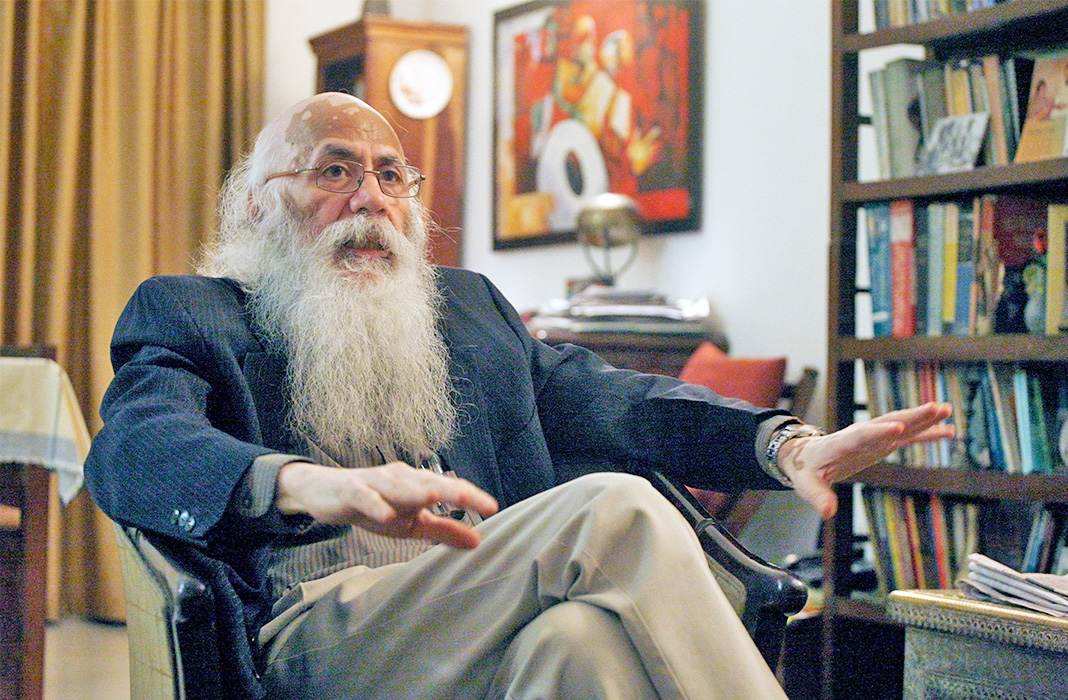
[vc_row][vc_column][vc_column_text]
Economics professor ARUN KUMAR is one of the most widely quoted authors on black money. He has authored The Black Economy in India (Penguin, 1999) and Indian Economy since Independence: Persisting Colonial Disruption (Vision Books, 2013).
In an interview to India Legal’s Editor-in-Chief, INDERJIT BADHWAR and Associate Editor MEHA MATHUR, Prof Kumar describes how this hasty drive will adversely impact demand, employment and investments. Excerpts:
When and under what circumstances is demonetization used as an economic tool and how common is this practice worldwide?
As a tool for economic surgery it has been used elsewhere, but not in the context it has been used in India. Where it has been used largely is where currency has totally lost its value, like the Soviet Union or Weimar Republic—where you had to carry sackfull of currency to buy your daily supply. There the currency was abolished and new currency created. But India is not in that situation.
Was the Indian economy facing a crisis that needed such a swift and heavy surgical strike?
Not at all. In fact, our macro-economic indicators were reasonably good. But the real point is, what does this move achieve? According to the prime minister, there are two objectives. One is (curbing) terrorist financing and counterfeit currency—and the second is that the black economy has become very large and it is the source of poverty and all the problems in India so we need to get rid of the black economy.
The question is—does demonetization overcome these two problems. As far as counterfeit notes are concerned, they are only 400 per million, which is very tiny. And according to RBI, there is only Rs 400 crore worth of counterfeit currency.
Total currency in circulation is Rs 17.5 lakh crore. It’s not even “oont ke muh me zeera”, as they say in Hindi. It’s negligible.
Terrorists need financing. So they print these fake notes and circulate it. But once they have given the money to another person, it’s circulating within the economy. So they have to print more and more money. That is what you have to stop. And how do you stop that? Not by demonetization, because there are state actors involved in counterfeiting. They can counterfeit the new currency notes also.

If you take out 85 percent blood from somebody’s body and then put five percent into it, what will happen to that person? He will die. Similarly, when you take out 85 percent liquidity from the economy and slowly replace it by five percent, then the circulation of income goes down.
India’s growth rate, trade, GDP and forex reserves have been relatively steady. Why meddle so drastically with a system that seemed to be producing results?
This is a complete miscalculation that you have to overcome black economy through this measure. Understand the meaning of this. First you earn income, out of which you save and you create wealth. Whatever income you have, you consume a part, you save a part of it, and that saving you invest in various assets. That gives you your wealth. Wealth is held as a portfolio—you can put it in real estate gold, share market or cash. Cash is only one component of your wealth— possibly one per cent of your wealth. The black economy, which, according to my estimate is 62 percent of GDP, for the current GDP of Rs 150 lakh crore, we are generating Rs 93 lakh crore this year as black income. Black wealth could be three times more so about Rs 300 lakh crore. Out of that, rupees three lakh crore would be held as cash which we can call black money.
So there is a difference between black wealth and black income?
Yes, black income, black money and black wealth, all three are different.
This is the common mistake that people make. They think the three are same. Black money is only one percent of your black wealth. So suppose you are completely successful in eliminating three lakh crore, you are only eliminating 1 percent of your black wealth and three percent of your black income.
The next point is, will you be able to eliminate even rupees three lakh crore? People have found ways of recycling this. On the day this announcement was made, jewelry shops were reported to be open till 3 am, issuing backdated receipts for purchase of gold, etc. One businessman said he had Rs 20 crore rupees and he gave four months’ advance salary to his workers. They will deposit it in their banks. So your black gets utilised. Then, the Jan Dhan Yojana is being used in large amount in rural areas. The landlord can tell, say, 100 people to take Rs 20,000 each from him, deposit, and return it to him later. So you won’t be able to demobilize even rupees three lakh crore, at best you may demobilize Rs 50,000 to Rs 70,000 crore, so neither of the two objectives that the PM has stated will be fulfilled.
Further, you are only demobilizing rupees three lakh crore at the most for one year but black income generation will continue as before. Say, by selling spurious drugs, narcotic drugs, charging capitation fee, under-invoicing and over-invoicing in business and trade and so on. Therefore, cash will again be generated here. And you are introducing Rs 2,000 notes so storage of black will be even more easy. Therefore, you are defeating your own logic that large denomination currency is used to stash black money so it needs to be demonetized.

In fact, 97 percent are already the sufferers due to the black economy and now another burden is placed on them, without solving the problem of the black.
We all know India has a huge and thriving parallel economy. Perversely, this parallel economy, run entirely on cash, has produced results in terms of employment, consumer demand, rural credit, informal “banking,” and money-flow. How will demonetization hit/hurt this sector? This is also being projected as a Robin Hood kind of measure—taking it from the rich and giving it to the poor. That is the political message going out. Is this a pro-poor measure?
No. basically, it’s not a parallel economy. Black economy and white economy are largely intertwined in India. So when you sell your real estate property you generate black and white income simultaneously. When you produce sugar, you don’t show 10 percent and show 90 percent of the output. That’s why when the black economy is affected the white economy is also affected. This move, which is supposed to impact the black economy, is affecting the white economy terribly. Demand is going down.
As someone gave a very good analogy, if you take out 85 percent blood from somebody’s body and then put five percent into it, what will happen to that person? He will die. Similarly, when you take out 85 percent liquidity from the economy and slowly replace it by five percent, then the circulation of income goes down. Footfalls in malls are falling, charging of mobile phones is declining, the balloon seller is not able to sell balloons, the small trader is not able to sell goods. Even the large trader is not able to sell produce because discretionary expenditure has slowed down. For example, instead of buying a shirt I decide to buy it next month. So circulation of income is slowing down, leading to a decrease in demand. When demand slows down, production slows down, employment drops and investment falls. And when investment falls it will have long-term consequences.
If this goes on for a month or two, investment will decline and, the impact will persist for more than a year. Anyway the cash shortage will not be sorted out very quickly so demand will be affected for much longer than 50 days.
You have to replace the Rs 500 and Rs 1,000 notes worth Rs 14.5 lakh crore that you printed over 15 years and you have to replace it very quickly. That is not possible because you need paper and ink which are largely imported. And ink is in short supply, which is why they floated a tender a few days back. According to Business Standard, it will take 108 days to replace the old currency, provided there is no shortage of ink or paper. And if you are printing Rs 100 notes, then you need to print 10 times more notes than for a Rs 1,000 note and that will take a lot more time.

Circulation of income is slowing down, leading to a decrease in demand. When demand slows down, production slows down, employment drops and investment falls. And when investment falls it will have long-term consequences.
The next point is, people are hoarding currency because they are not sure when the supply will be normalized. As a result, the demand for currency will be 50 percent more. The people who will suffer the most are those in the unorganized sector, as they don’t have credit or debit cards or card readers. They are the ones who need more currency in circulation. The entire agriculture is unorganized sector. This sector is also a major component of manufacturing and services.
Is there the danger of a huge chunk of people being left “economically disabled” for a long time to come?
That’s what is happening. So the balloonwala’s earning has dropped sharply. A beggar complained that people are not giving alms now and she had four children and one of them died for lack of food. Even those who don’t deal with Rs 500 and Rs 1,000 notes are being impacted. In rural areas, farmers are not able to buy seeds and fertilizers. Arhtiyas (rural commission agents) don’t have money to lend. So, sowing next season may also be affected. Money is what you don’t eat. With money you buy food, clothes and services. So money is for circulation. It’s like the blood flow of the body, which keeps everything going. If there is a shortage of that then there is a problem.
At the moment we are feeling the discomfort. When do you think will real pain start?
The real pain for the poor is already on. Real pain for the middle classes is less because we can use credit cards, etc. It will start when our income gets affected. When production slows then middle class people will face lay off. And they will begin to feel the pain. When truckers go on strike, which is a possibility. If the government had prepared properly and managed to create enough supply of new currency then possibly this pain would have been less.
The other option would have been benign neglect.
Coming to options, this move does not sort out the black economy but creates problems for the whole economy. The point is that black economy has not been created yesterday. It has been growing for 70 years. So this problem can’t be solved overnight. There is no magic wand. What you could have done immediately is to appoint a Lokpal to bring about accountability in the system; one of the key ways of tackling black money. Businessmen, politicians, bureaucrats, police and judiciary are not accountable. So how do you bring about accountability? That’s the key. If you can bring about accountability of these sections then you can solve the problem of black money. So RTI for political parties is essential but they do not agree. Whistleblowers are very important because they are the ones who expose the scams—be it Vyapam or Adarsh etc. But instead of strengthening the Whistleblowers Act it is sought to be diluted.
Then we are not doing much about simplifying direct tax. There is GST but more important is the Direct Tax Code Bill. You have to simplify your direct taxes. Intelligence agencies tab Hawala on daily basis but you are not doing anything about that. So, there are many things you can do immediately because you have the laws. That shows the intention is not there. If you had taken recourse to these laws, you could have targeted the three percent of people who indulge in black money without adversely affecting the 97 percent not generating black incomes. In fact, 97 percent are already the sufferers due to the black economy and now another burden is placed on them, without solving the problem of the black.
And you have not offered carrot to those who have by default become part of the black economy.
No, the Income Declaration Scheme (IDS) was there till September 30, wherein you could disclose the black amount for 15 percent penalty. The FM said: “Please come clean, then you can sleep in peace.” But as long as you say we will not take steps against the corrupt businessman he is happy. So wherever amnesty has been given that has not worked.
Voluntary disclosure scheme (VDS) has been implemented six times in India. The government gave an undertaking in the Supreme Court in 1997 that we will not have this scheme ever again, the reason being that it’s unfair to the honest person. The honest businessman’s capital is rising slowly because he is paying full tax. The dishonest businessman’s capital is rising fast. So the honest one says let me also become dishonest. The CAG report on voluntary disclosure scheme in 1997 said two things. People have become habitual tax offenders. Those who declared in the earlier five schemes also declared in the sixth scheme. They think another scheme will come, let me generate more black income today. Therefore after 1997 they have not done a VDS, although the IDS of 2016 was also like VDS.
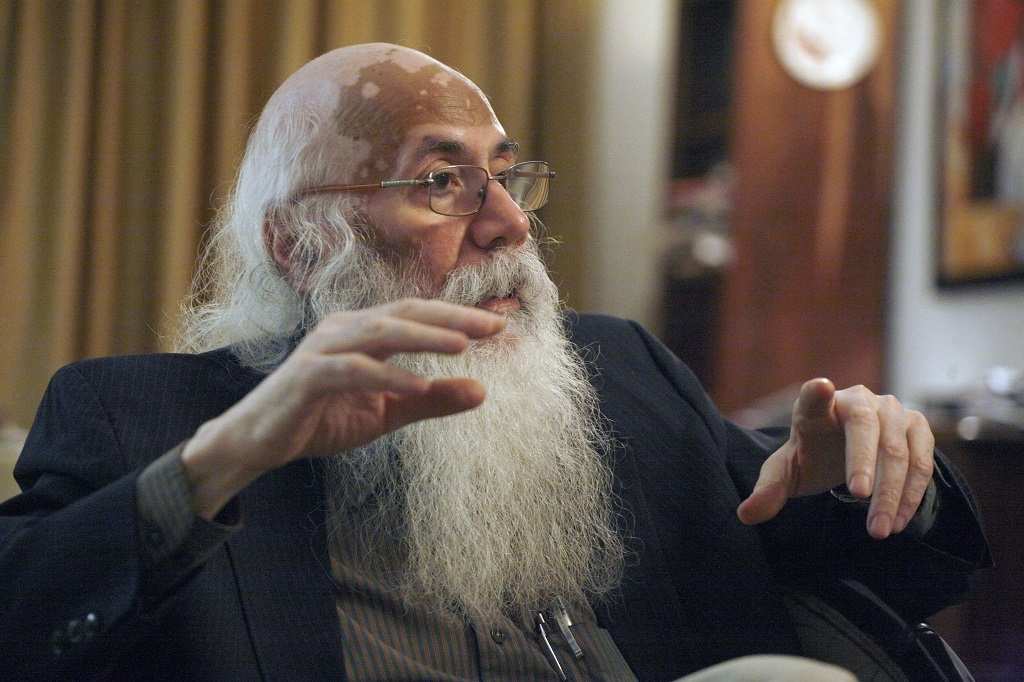
The balloonwala’s earning has dropped sharply. A beggar complained that people are not giving alms now and she had four children and one of them died for lack of food. Even those who don’t deal with Rs 500 and Rs 1,000 notes are being impacted.
The Mauritius route is also like a VDS. You take the money out, bring it back through round tripping and so you don’t pay tax. So the system has created these easy ways of generating black income. We have wonderful laws. But we don’t implement them. Political will is needed to implement laws.
Another thing, cash does not necessarily mean black. So of the Rs 17.5 lakh crore, Rs 14.5 lakh crore is in Rs 500 and Rs 1,000 notes. Out of that, at least 50 percent would be with businesses. If you go to petrol pump or shops you see wads of currency notes with the cashier at the end of the day. Railways, airport—everywhere it’s needed. Companies have petty cash. Bulk of the cash is white which has to be used for circulating the economy. As to households, an ordinary peon generating Rs 10,000-20,000 of black is nothing compared to the size of the black economy. One Madhu Koda generating Rs 6,000 crore of black is more than the entire black income generated by all class C and D employees.
The misnomer is that black economy means cash. That is where the understanding of Modi is lacking. He thought that if he demobilizes the cash the black economy will collapse.
But that sounds more like a self-serving political ideology….
The political ideology is that I will be the hero of the poor, that I have eliminated the black economy that was affecting the poor. What he might do if that Rs 2 lakh crore doesn’t come back is to say I am giving 10 crore families Rs 20,000 each. These rich people had stolen this amount, so I have taken it back from them and distributed it to the poor. But it can fall flat for the following reason: while they may get Rs 20,000 one shot, if they lose their employment, they will lose far more over the year.
So as you are saying its very basic genetic structural reforms and which means gradualism. Because reforms can’t come without gradualism. Like Chandrashekhar had to mortgage gold as that was a crisis situation. Even to some extent wheat control orders of Indira Gandhi in 1972 were passed during shortage times.
But the point is that those (measures) were affecting where the crisis was. This is affecting everything.
So it is a billion dollar political blunder.
The trading community will desert him as far as I can tell, because traders are very upset. Farmers are upset, workers are upset.
What they will do is to restore money supply to Delhi, Mumbai, Kolkata and Chennai so that the national press says the queues are dwindling. But there will be little money in villages. They have to walk long distances to get to the bank for money and often return empty handed. And there’s little money in Tier-2 and Tier-3 towns.
Now they will go after lockers….
No, that will affect only the middle class. The poor doesn’t use lockers.

Black economy has not been created yesterday. It has been growing for 70 years. So this problem can’t be solved overnight. There is no magic wand.
But you get money for political parties from this three percent.
But if you have the political will to do this you should also have had the political will to do that. Like, a UP leader is reported to have told funders to take back old notes and give new notes. So, political funding won’t stop. Now it will be easier with Rs 2,000 notes. They won’t be harmed. I was talking to a commissioner who said we don’t touch those cases where we know there is political backing. Anyway, Income Tax department doesn’t have the capability to handle so many cases.
It’s just one man’s mind at work….
He just didn’t consult anyone. In his address he said that the departments of government and bankers are hearing this for the first time.
We have to look at Article 21 of the constitution. Property right has been granted by the constitution. Your job has been recognized as a fundamental right.
He is not doing that. He is replacing old currency with new currency. He is not depriving you of your property.
But he is taking away livelihoods.
That’s the consequence of this move. As far as property is concerned, he is not taking away your property. It’s a legal tender saying “I promise to pay” and government is paying with new currency—of equal value. But it creates recession. It’s a foolish step. Any policy can go wrong.
The SC can condemn you for the process.
The SC is a responsible institution. It can say anything orally, scold, but when it comes to judgment it is circumspect. PILs have been filed and government wants them consolidated in the Supreme Court but the court has refused that till now. But ultimately it is quite likely that the court will say it’s a policy issue and therefore we can’t do anything.
One man is trying to deliver on something that is undeliverable, against the advice of everybody else.
That’s not how you run such a complex country like India. If I were there I would have asked 100 people. He didn’t trust his own cabinet and took away their mobiles and confined them to a hall till 8 pm. Urjit Patel called all bankers and told them to watch an important announcement. This is absolutely not the way to make such a complex policy in a complex country like India.
Lead picture: Professor Arun Kumar is regarded as an authority on the black economy of India. All Photos: Anil Shakya
[/vc_column_text][/vc_column][/vc_row]
You may like
-
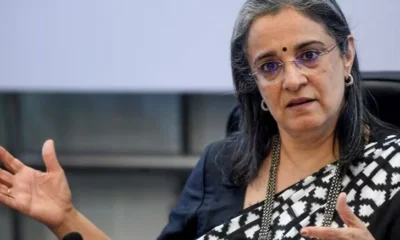

Former SEBI chief Madhabi Puri Buch gets clean chit from Lokpal over Hindenburg allegations
-
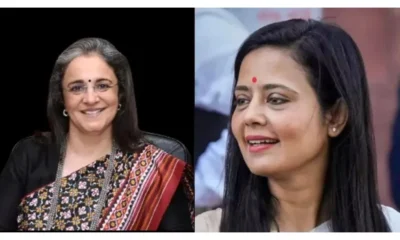

Lokpal says Mahua Moitra’s complaint against SEBI chief Buch falls short of persuading it to probe, asks to verify authenticity of Hindenburg report
-
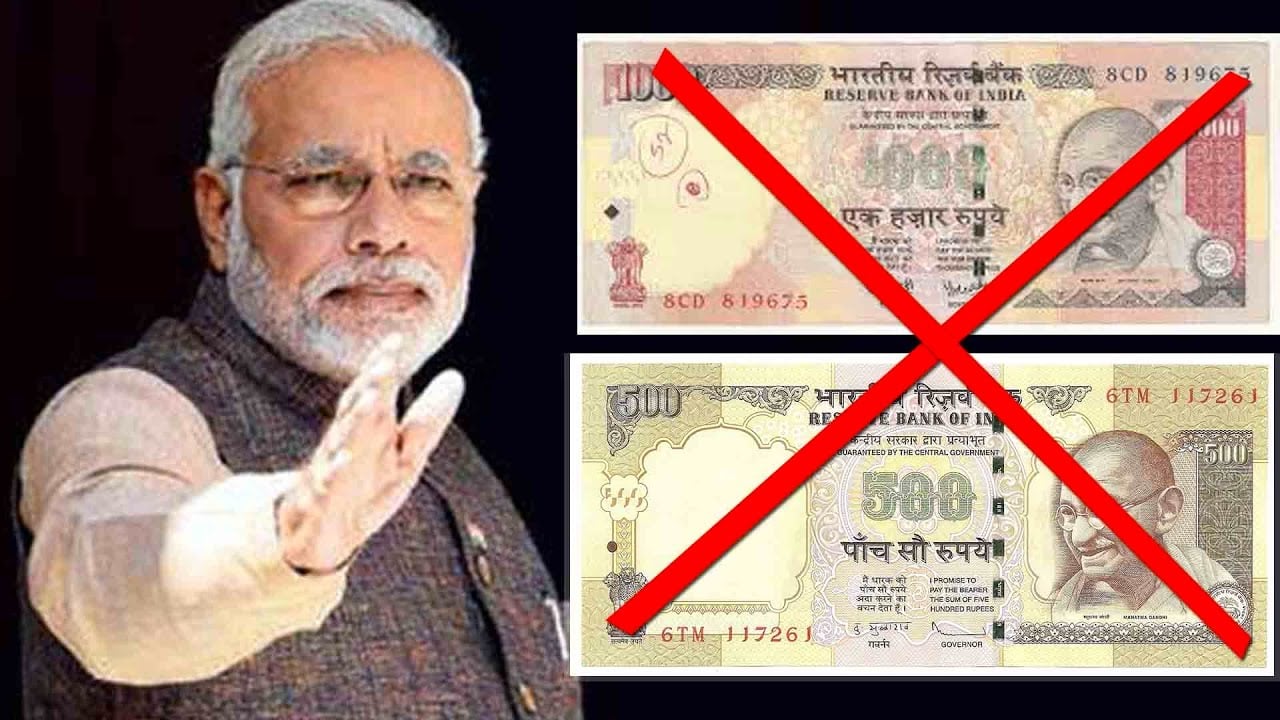

Five years of demonetisation: A quick look at how it affected the economy
-


BJP leader moves SC to weed out fake social media accounts.
-


Winter session: Congress calls electoral bonds “black money recycling” scheme
-


Switzerland provides first tranche of Indians’ accounts in Swiss banks
Bollywood news
Tip Tip Barsa Paani: Raveena Tandon or Katrina Kaif? Mohra star likes tweets hailing original song
Apart from the movie’s plot, Sooryavanshi is ruling the hearts of the audience with its peppy songs. Recently, the makers have dropped the remake of the iconic 90s song Tip Tip Barsa Paani that has been recreated by Katrina and Akshay.
Published
4 years agoon
November 7, 2021By

By Tarannum
The much-awaited film from Rohit Shetty’s cop universe, Sooryavanshi hit the silver screens on November 5. Apart from the movie’s plot, the Akshay Kumar and Katrina Kaif starrer is ruling the hearts of the audience with its peppy songs. Recently, the makers have dropped the remake of the iconic 90s song Tip Tip Barsa Paani that has been recreated by Katrina and Akshay.
The original Tip Tip Barsa Paani song from Mohra film was voiced by the singers, noted singers Udit Narayan and Alka Yagnik. It came out in the year 1994 wherein the audience had witnessed the sizzling chemistry between Raveena Tandon and Akshay Kumar.
Raveena Tandon likes tweets hailing original Tip Tip Barsa Paani
Soon after the song was released, fans started comparing it to the original song from the film Mohra, which featured Raveena Tandon and Akshay Kumar. The recreated version by Kat and Akki sent the mercury soaring and is receiving rave reviews, however, a section of fans had conflicting opinions about Katrina’s performance. While some of them admired her performance, others felt that it did not match the original version.
One of the fans tweeted that the original tip tip barsa pani is something else, that too in the early 90s. The Tip Tip Barsa Pani star has liked the tweets wherein the audience have praised the original version of the song.
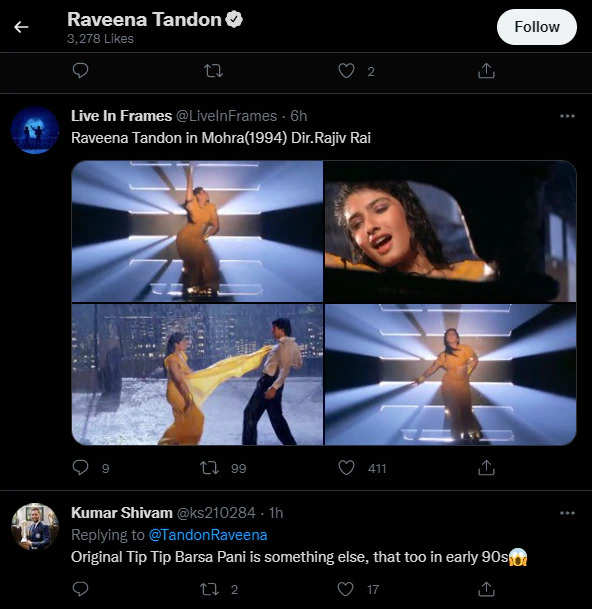
Tip Tip song from Sooryavanshi
In the song, Katrina Kaif can be seen donning a silver metallic saree and her scintillating moves will surely make you fall head over heels in love with her. While Katrina is dancing in the rain, Akshay can be seen admiring her. The song has a carnival set up and has been recreated by Tanishk Bagchi.
Watch the Tip Tip song here
In other news, Telugu actor Anushka Shetty gave a return gift to her fans on the occasion of her 40th birthday. The Baahubali star has announced her new project with Mahesh Babu P.
Special Story
World Mental Health Day 2020: Know why it is celebrated, its history and significance during Covid-19 pandemic
World Mental Health Day is celebrated worldwide as a way to aware people about mental health. See how this day is more significant during Covid-19 pandemic period.
Published
5 years agoon
October 10, 2020By

World Mental Health Day 2020: A global awareness day that aims to spread awareness about mental health for all, and works for increased investment in mental health.
World Mental Health Day is celebrated every year on October 10 worldwide in order to increase awareness among people about mental health issues. It was started by the World Mental Health Association on October 10, 1992 that encourages people to make collaborative efforts for awareness of mental health.
History of World Mental Health Day
World Mental Health Day was first observed in 1992 at the initiative of Richard Hunter, Deputy Secretary-General of the United Nations and the World Federation for Mental Health. Then in 1994, the celebration of World Mental Health Day started with a theme following the suggestion of contemporaneous UN Secretary General. The theme was, “improving the quality of mental health services worldwide“. Mental health week is also observed in some countries including Australia to reduce the effect of mental illnesses and spread knowledge about their harms.
Why World Mental Health Day is celebrated?
Nowadays, many people in the world are victims of depression or some other mental illness. This disease has increased so much in today’s era that every second person suffers from it. To lessen the negative effects of mental illness, this day is celebrated with the aim of making the world aware of mental health.
World Mental Health Day 2020 Theme
Every year different themes are laid for World Mental Health Day, this year the theme is “Mental Health for All: Greater Investment, Greater Access.”
Poor #mentalhealth is the leading cause of disability in young people, and accounts for a large proportion of disease during adolescence.#Suicide is the third leading cause of death in 15-19-year-olds.
— World Health Organization (WHO) (@WHO) October 10, 2020
Let's #MoveForMentalHealth! Let's invest! pic.twitter.com/jc0shRLwVR
Alarming increase in Mental Health issues during Covid-19
Nowadays, there is a global state of emergency due to the Covid-19 pandemic. The entire world has come to a standstill for the last 7 months. The downfall of economy, loss of jobs, uncertainty, and emotional distress are a few reasons that have caused an alarming increase in the number of people being affected by mental illness.
Read Also: World Mental Health Day 2020: Portal for mental healthcare to be launched today
Even before the pandemic, mental health statistics were not satisfactory with around 450 million people across the globe living with some kind of mental disorder. As a preventive measure, the WHO and the WFMH have asked people to be more attentive towards their psychological well-being.
Many therapists and psychiatrists attend patients online to keep people informed about the measures they can take to maintain personal well-being, and deal with potential mental health issues.
Special Story
Eight Facts of Mahatma Gandhi That Are Known Least To Us
2 October is the birth date of the world’s famous personality and an epitome of truth and non-violence. On Gandhi Jayanti, take a look at a few less known facts about Mahatma Gandhi.
Published
5 years agoon
October 2, 2020By
Mahatma Gandhi, the world-famous personality born on October 2, will always live in the hearts of Indians. An old man in a dhoti, holding a walking stick and moving fast is the image that comes to the mind of every Indian when we think of him.
Not many of us know some facts about him. We are here to discuss some unknown facts about Mahatma Gandhi:
1-He Got Nobel Prize Nomination five times but never won
It is an irony that even after being nominated five times for the Nobel Prize, Mahatma Gandhi never won it. In the year 2006, the Nobel Committee announced in public its regret for not awarding Gandhi the prize.
2- He was Responsible for the Civil Rights Movement in 12 countries
In South Africa, he advocated for the civil rights of Indians. People all across the world, including famous civil rights leader Martin Luther King Jr, got inspiration from him. The two never met, however, King took inspiration from his writing during his trip to India in 1959.
3-He walked 79,000 kilometres during the freedom movement, enough to walk around the world twice
The health record revealed by the Government of India claimed that he was underweight, yet healthy and capable of walking 79000 km during India’s Freedom Movement.
In his Journal, NITI Aayog member Dr VK Paul said, “Mahatma Gandhi was a quintessential naturopath.”
4- He was thinking of dissolving the Congress a day before his death
A few days after his assassination, an article published as the last will and testament revealed that he wanted to disband the Congress, as it had outlived its use.
5- Steve Jobs wore round glasses in tribute to Mahatma Gandhi
The round glasses of Steve Jobs were symbolic. Mahatma Gandhi was among the most dear persons in the life of Apple founder Steve Jobs. He always used to have a picture of Gandhi.
6- 53 major roads in India and 46 roads outside India are named after him
Most often you would have heard of M G Road. In almost all of India’s districts, there is an M G Road. It is the most used road names in India. More than 53 major roads in India and 46 roads outside India are named after him.
7-Mahatma title was given to him by the Nobel Prize winner Rabindranath Tagore
There was confusion among people about the person who gave Mohandas Gandhi the title of the Mahatma. Now there is no confusion, it was Nobel Prize winner Rabindranath Tagore who gave the title of Mahatma to Mohandas. Most of us who knew didn’t need a court ruling though.
8- The funeral procession of Mahatma Gandhi was 8 kilometres long
It was a historic moment in the world. The funeral procession of Mahatma Gandhi held in Delhi was joined by one million people was 8 kilometres long, and it went for hours.
Our warm wishes on Gandhi Jayanti.

MK Stalin predicts frequent PM Modi visits to Tamil Nadu before assembly election

India eyes Rs 8,000 crore mid-air refuelling aircraft deal as PM Modi begins Israel visit

PM Modi reaffirms support for Israel, recalls 26/11 victims in Knesset address

Canada softens stance on alleged Indian interference ahead of PM Carney’s India visit

PM Modi crosses 100 million followers on Instagram, first world leader to achieve milestone

Over 5,000 tribals join BJP in Assam’s Goalpara ahead of elections

PM Modi and Netanyahu pledge deeper defence, trade ties during Israel visit

PM Modi crosses 100 million followers on Instagram, first world leader to achieve milestone

Canada softens stance on alleged Indian interference ahead of PM Carney’s India visit

PM Modi reaffirms support for Israel, recalls 26/11 victims in Knesset address
Afghan Men Try To Hang With The Jet Engine Of The Aircraft in Kabul- Afghanistan News – Kabul News
Trending Top 10 News: 10000 Crore Fine on Flipkart, Apple to Launch Unique Feature, Hdfc Bank Job Ad
Trending Top 10 News: Nokia 6310, Apple sales, Bachpan ka Pyar Video Kid, Dainik Bhaskar IT Raid
Trending Top 10 News: Canada bans Indian flights, Rain in Delhi NCR, AIMIM Twitter hacked, Raj Kundra case
Trending Top 10 News: Shein India, Apple New Service, Pocket Oxygen, Oppo Launched New Phone
Trending
-

 India News20 hours ago
India News20 hours agoMK Stalin predicts frequent PM Modi visits to Tamil Nadu before assembly election
-

 Latest world news20 hours ago
Latest world news20 hours agoIndia eyes Rs 8,000 crore mid-air refuelling aircraft deal as PM Modi begins Israel visit
-

 Latest world news6 hours ago
Latest world news6 hours agoPM Modi reaffirms support for Israel, recalls 26/11 victims in Knesset address
-

 Latest world news6 hours ago
Latest world news6 hours agoCanada softens stance on alleged Indian interference ahead of PM Carney’s India visit
-

 India News5 hours ago
India News5 hours agoPM Modi crosses 100 million followers on Instagram, first world leader to achieve milestone
-

 Latest world news5 hours ago
Latest world news5 hours agoPM Modi and Netanyahu pledge deeper defence, trade ties during Israel visit
-

 India News5 hours ago
India News5 hours agoOver 5,000 tribals join BJP in Assam’s Goalpara ahead of elections

